Reflections from reDesign’s Youth-Led Session at #Aurora23
CompetencyWorks Blog
reDesign’s Youth Advisory Council is a year-long program for high-school students with an interest in identifying, analyzing, and shifting educational paradigms. Students in the program work directly alongside our Learning Design Team to share feedback and ideas, while simultaneously leading their own investigative projects focused on creating meaningful change in their school communities.
In October 2023, reDesign presented a session at the Aurora Institute Symposium 2023 in Palm Springs, CA which focused on “Centering Youth Voices”, and was led by two of our Youth Advisory Council students — Ellah Wambach and Salome Murcia-Gonzalez. As part of reDesign’s work with the Aurora Institute as a Student Sponsorship Sponsor, Salome, along with 9 other high school student attendees, traveled to Palm Springs to be part of the conference in person.
Hear about Salome’s experience, alongside her mother, Sandra Gonzalez, who joined her at the Aurora Institute Symposium, in this video.
As I write this, it’s a bleary autumn day in the city of Chicago. It’s hard to believe that not too long ago I was soaking up bright ideas (and even brighter sunlight) in Palm Springs, California at the 2023 Aurora Institute Symposium! It felt like the perfect time to gather up my co-conspirators at reDesign, and reflect on our experience — after all, it’s not every day that you get the opportunity to run a youth-led session for a national audience of educators.
With that in mind, I got together with Salome, Ellah, and Adrienne one more time to talk a little bit about our session on Centering Youth Voices, and our broader experiences at Aurora 2023! Below is an edited transcript of our conversation. You can listen to the entire conversation here (Passcode: 5M!Gj8dV).
SPEAKERS:
- Salome Murcia-Gonzalez is a high-school student in Vancouver, BC, Canada, and a member of reDesign’s Youth Advisory Council program.
- Ellah Wambach is a high-school student in Round Rock, TX, USA, and a member of reDesign’s Youth Advisory Council program.
- Adrienne Vitullo is a Learning Experience & Curriculum Designer at reDesign, and a coordinator of our Youth Advisory Council Program.
- Rohan Menon is also Learning Experience & Curriculum Designer at reDesign, and a coordinator of our Youth Advisory Council Program.
- Melissa Slater is a School Leadership & Instructional Coach at reDesign, and a coordinator of our Youth Advisory Council Program.
On first impressions about Aurora…
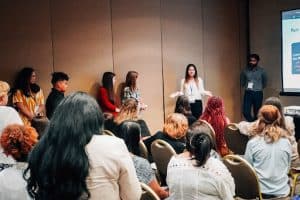
ROHAN: To start, I would love just general first impressions. I know Aurora might feel like it was 10 years ago… or maybe it feels like 10 minutes ago! But first impressions, what are your memories of it?
ELLAH: I thought it was super fun. And I thought everyone was really engaged. And the questions are super insightful. And I was just really refresh[ed] to see how well they were listening.
SALOME: Yeah, I absolutely loved how everyone was so passionate about the topic. And you know, they were actually willing to listen to our opinions, and make comments about it. The whole experience itself was, I think, really inspiring! It helped me gain a lot of knowledge, you know, not just about doing presentations, but also about the educational community itself.
ROHAN: Yeah, awesome. Adrienne, what did you think from your perspective about our session? How are you feeling about it?
ADRIENNE: Yeah, I feel like so many of the sessions were focused on delivering information, and ours was really interactive! People were able to talk amongst each other, and also talk to you guys in productive ways… and that felt really great.
I also appreciated how much we got people to move around the room. It’s not a normal thing for a lot of presentations, maybe to their disappointment, I don’t know! But I also just think you both were so poised and thoughtful in your responses. I heard from other people that everyone was really impressed by the thoughtfulness that you guys put forth… as always!
ROHAN: Impressive, but not surprising… that’s what I’d say. Yeah, I’d definitely second that.
On speaking to educators around the country…
ROHAN: I was looking at some of the footage that we’ve gotten of our session, and there are these awesome pictures of each of y’all in front of a big crowd of teachers and policymakers – people from, you know, all over the country, different schools, different places of work, all listening really intently to what the two of you had to say… I’m curious what that felt like, to share your ideas with a room full of educators that are going to go back and impact students in so many different ways. Did you guys think about that at all? How are you feeling about that aspect of it?
SALOME: I thought it was really great. Honestly, I usually get nervous when I’m presenting something in front of any group of people. But I was really confident during this presentation, I wasn’t feeling any butterflies in my stomach… I was super excited! And I remember practicing the night before, just reading over my notes, and I was so excited. I just wanted to get to it, you know? So yeah, it was definitely fun.
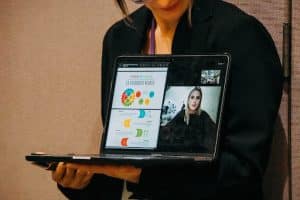
And also, the audience obviously has a big impact on how you are sharing the information. If it’s, I don’t know, a project for school, and I can tell that my classmates are not really interested… I don’t think I’m going to be as interested in the topic myself. But you know, seeing that everyone was really listening, really paying attention, that just made me even more passionate and more excited to share my ideas with them.
ELLAH: Yeah, I agree… I was definitely the most excited to do this presentation, out of all the presentations I’ve ever done! I think the audience definitely made it worth it too — it felt more like a conversation, just because of how engaged they were, which was really nice. That made it a lot more comfortable.
And also, the fact that they were so engaged gives me a lot more hope that they will implement it — I do hope that they’ll go to their classrooms, and hopefully talk to their students and stuff. And I think based on their reactions, they will!
On having an impact…
ROHAN: That was actually going to be my next question — what kind of impact are you both hoping that our session had? You shared your words, your ideas, your projects… What kind of impact would be ideal that you have on the folks at our session?
ELLAH: I love what reDesign does with the Youth Advisory Council, just getting student feedback. I’ve always wanted to give my teachers feedback, but it’s not… I feel like it’s not your place! You can’t just go up and say it, they have to ask for it. It’s just an uncomfortable boundary.
So if teachers invite that… I hope these teachers learn that it’s good to invite that feedback, and it’ll make it a lot more comfortable between teachers and students. It’ll make the classroom environment more fun. I hope that that’s what those teachers took from that, and they implement it.
ROHAN: Salome, what about you? What kind of impact on the teachers would be ideal for you? What’s your dream, that you hear about teachers doing because of this session?
SALOME: I totally agree with what Ella has been saying — I definitely hope that they start using student feedback.
Just reading over the Google Form that I made for my project, and seeing the opinions of all my friends and peers… I’m seeing that a Grade 9 girl and a Grade 11 girl are very similar, you know, they just want their teachers to listen to them, and for them to be able to kind of understand each other. They want them to not just say “I’m your superior, I know more than you,” but instead “Let’s open a space for both of us to give each other feedback.”
So, yeah. I’m really excited for teachers to be able to do that with their students in their classrooms, and I’m excited for how students will react to that, because it’s a really special thing.
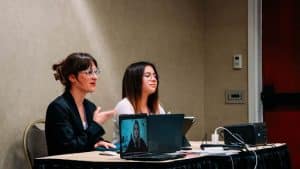
ROHAN: I feel like I haven’t really thought about what comes “after” our session at all, until now that it’s actually over! But now I’m picturing all the folks that came to listen to Ellah and Salome, and trying to think about what it is that I hope they’re taking back with them…
I’m curious for you, Adrienne, what is at the top of your mind as far as the impact you hope we had on those folks?
ADRIENNE: I think curiosity — I’m hoping that people that were in our session are going to talk to other people, and back at their schools, or at their workplaces, and share the interest and excitement that they felt in that session. And hopefully, that will spread some of our ideas.
But then also, I hope that people are really holding at the forefront of their brains that it is important to ask youth what they think… Similar to what we said in the presentation, I think about the work that our colleague Melissa is doing in South Carolina, and just holding that at the forefront can really shape how things happen in the world. And that can really make a difference — to students, but also to adults.
ROHAN: Yeah, absolutely. I was thinking earlier today about how great our audience was… I guess it makes sense that people who would show up to a session like ours, which was all about listening to students and incorporating their ideas into your work, would be people who are interested in doing that already!
But I felt like folks were so receptive to what Ellah and Salome were sharing, and even more broadly, to the overarching ideas of our session. Something Adrienne and I actually just talked about earlier today was that we tried not to be so prescriptive, right? We tried not to tell people “Hey, you should do a program exactly like ours, exactly the way we’re doing it.” It was kind of like “I don’t know what it looks like for you… but you should listen to your students, work with them, whatever that looks like for you!” Ellah and Salome, I’m sure that’s been drilled into your heads, because I know I was saying it so often leading up to the conference, but I think we really tried to keep the message very simple.
So I’m glad it seemed like it resonated with a lot of folks, and people were really excited to kind of start thinking about how to actually do this. We had a couple of folks reach out afterwards to follow-up with us about how they can start their own youth groups, and involve students in the work that they’re doing — so that’s really exciting!
On meeting other students in Palm Springs…
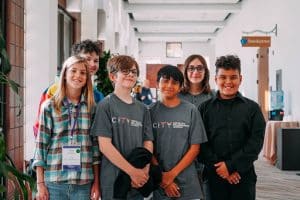
ADRIENNE: Salome, since you got to attend Aurora in-person, did you meet anybody cool at the other youth sessions you attended?
SALOME: I met two college students, who actually came to our presentation afterwards, which was really nice. Afterwards, one of the girls who presented the day before, from Washington DC, was talking to me about how she might apply to be part of our Youth Advisory Council! So we thought we should talk more about it, and just stay connected… so that was really great.
ROHAN: That’s awesome! So cool to hear that, Salome… that’s the magic of conferences, I guess!
On advice for other student presenters…
MELISSA: Can I ask a question, Rohan? I’m just wondering what advice you two might give to other students, or your fellow Youth Advisory Council members, or anyone at your school about doing something like this? Would you do anything differently if you did it again? What kind of advice might you have for others?
SALOME: I think for me, my main advice is just to really be passionate about what you’re talking about, because that’s kind of what matters at the end of the day. Even if people pay attention or not, what matters is that you know what you’re talking about, and you’re confident in it. That’s what makes the experience so great.
ELLAH: I agree. I honestly don’t have anything to add to that! It’s definitely going to make it a lot better, if you mean what you’re saying. I feel like it’s a lot more convincing that way.
ROHAN: So cool. We’re gonna have to share this little clip with every single one of our staff members who has to go present at a conference from now on… wise words from Salome and Ellah. That’s great
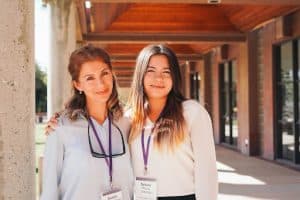
On pools and volleyball games…
ROHAN: Okay, so my last question for each of you… I’m going to go one at a time. This is the biggest question I’ve been wondering about… Salome, how was the pool, eventually?
SALOME: It was really good. It was cold! I was not expecting to be that cool. But then I got into the jacuzzi at one point, which is kind of insane because it was REALLY hot outside. But yeah, it was really nice.
ROHAN: Nice! Okay, I’m glad to hear that was a success…
And Ellah, you had a volleyball game that night, am I right? Did I remember that correctly? So… win, lose? How did it go?!
ELLAH: Honestly, I don’t remember…! Let me check my calendar, which game was it? It actually does feel like 10 years ago…
…was it last Tuesday? No, two Tuesdays ago — yes, we did win that game!
ROHAN: Awesome. Big success all around, I love to hear it.
Learn More
- Together We Shine Brighter: A Teacher’s Insights from #Aurora23
- Flashback Friday Inspired by #Aurora23
- Student Vlogs: A New Way to Elevate Student Voice in CBE
- Rekindling Our Commitment with Inspiration from the Aurora Institute Symposium 2023
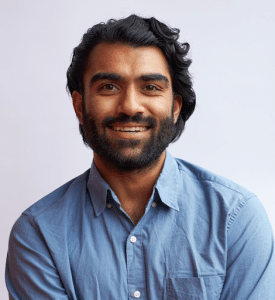 Rohan Menon is a curriculum designer at reDesign, and the Coordinator of reDesign’s Youth Advisory Council program. Drawing on a background in affective neuroscience, Menon’s work focuses on designing learning experiences that align with the principles of human biology, and centering the voices, ideas, and perspectives of the next generation.
Rohan Menon is a curriculum designer at reDesign, and the Coordinator of reDesign’s Youth Advisory Council program. Drawing on a background in affective neuroscience, Menon’s work focuses on designing learning experiences that align with the principles of human biology, and centering the voices, ideas, and perspectives of the next generation.
This article was co-published by reDesign and the Aurora Institute in December 2023.